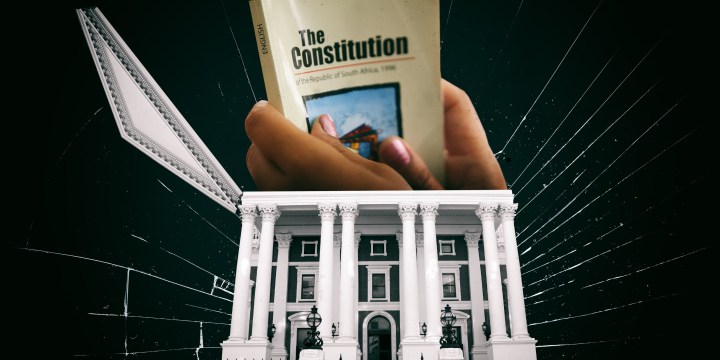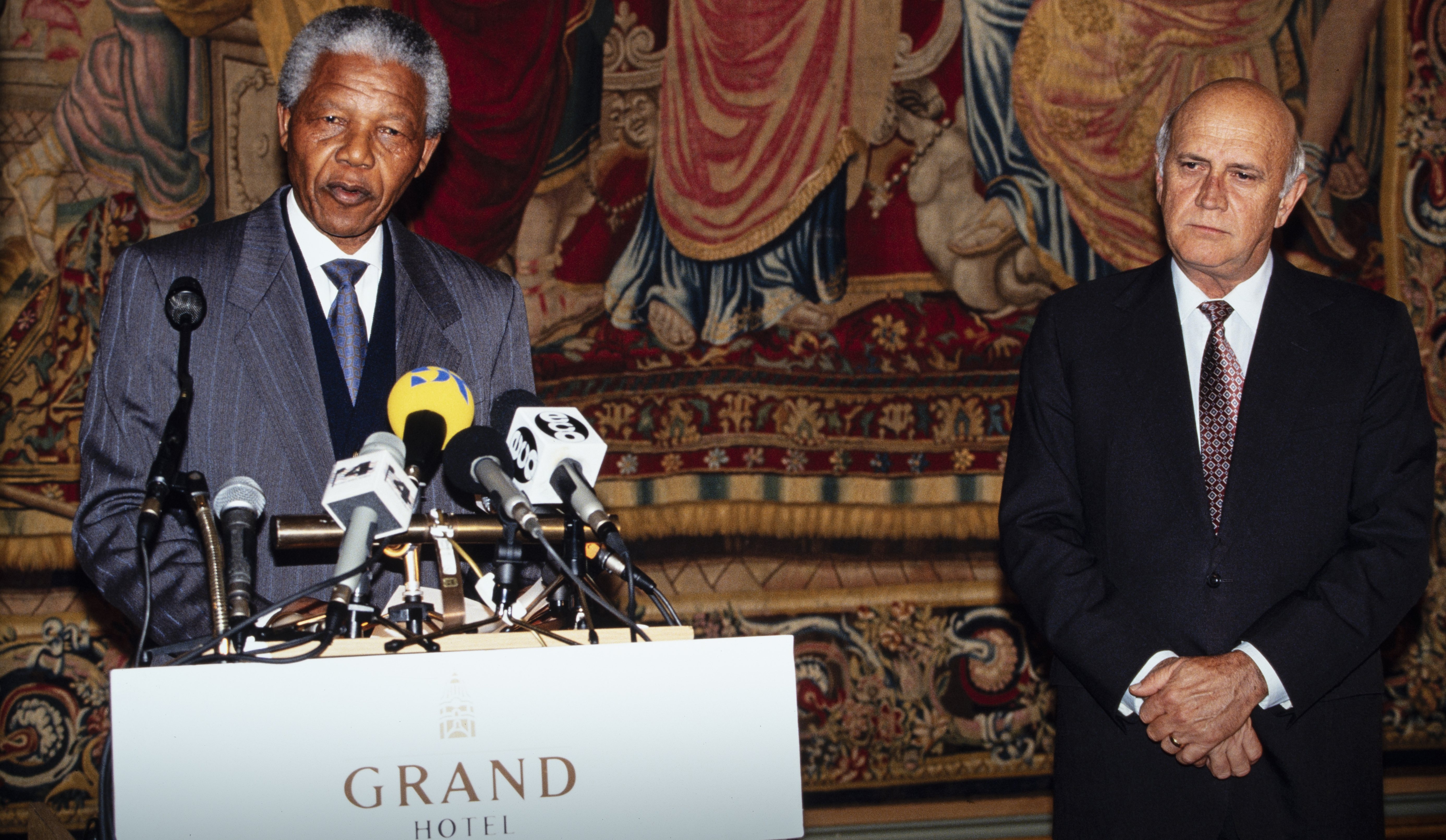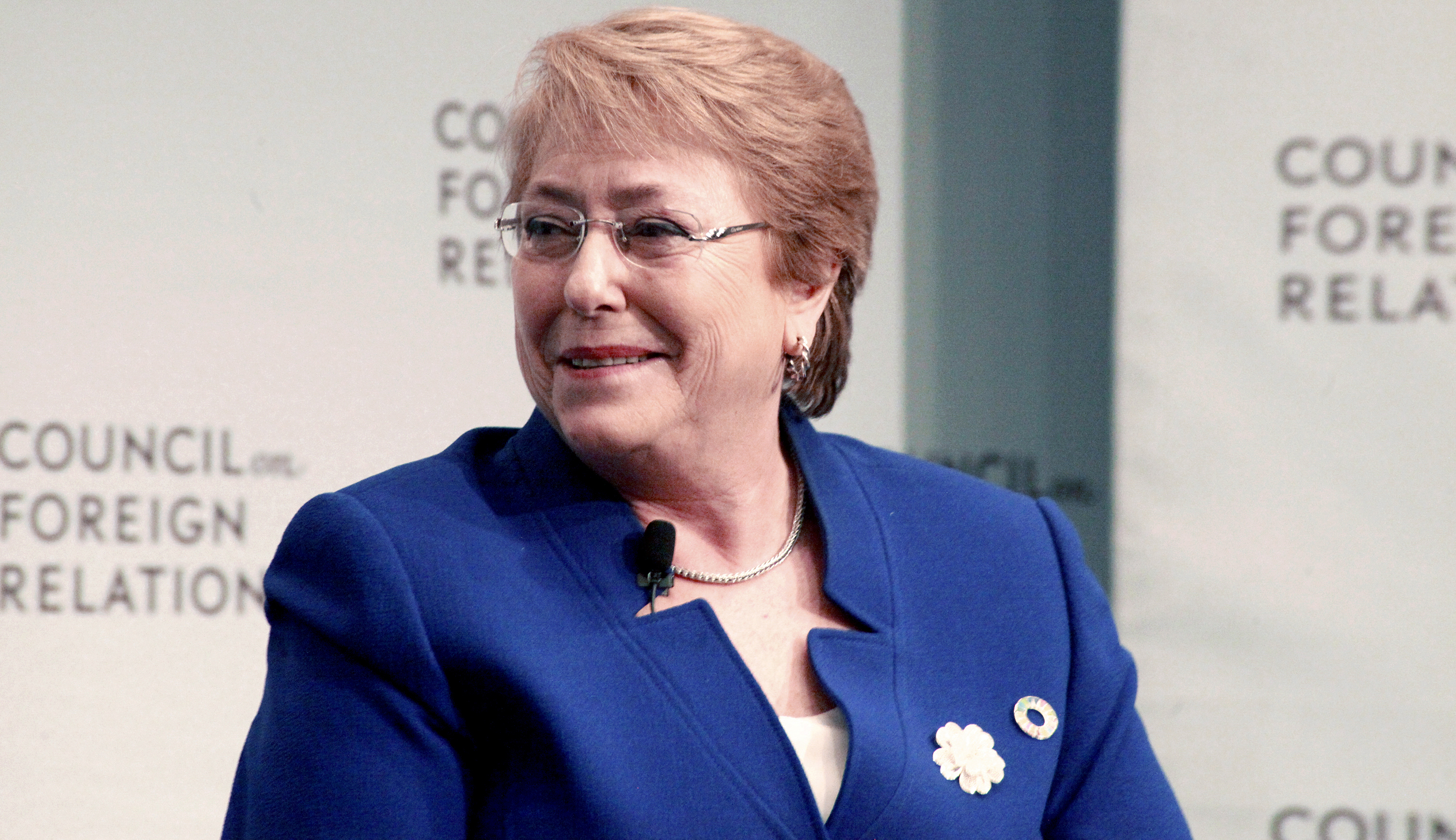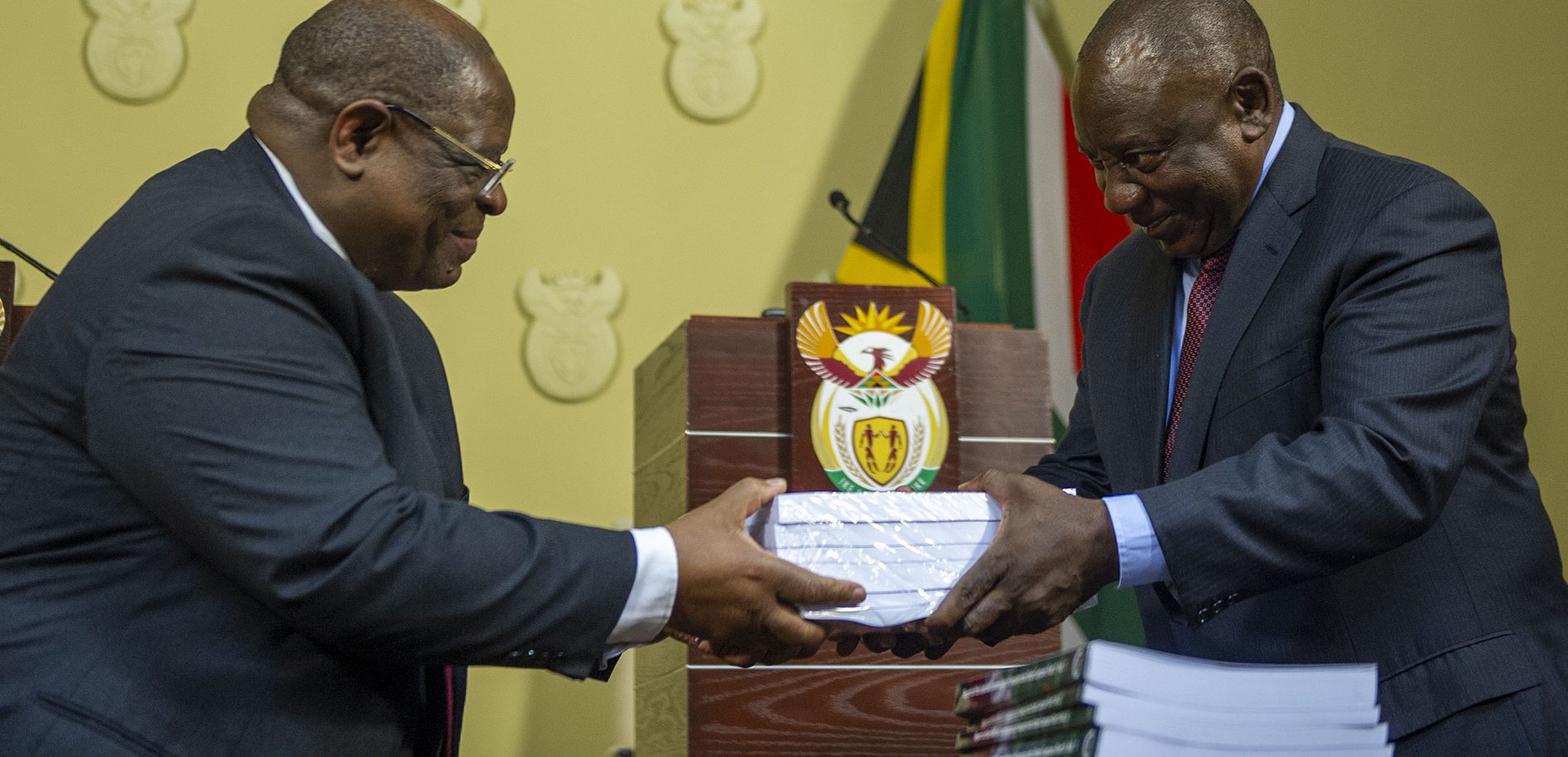DEMOCRACY OP-ED
The challenge is to not only have the South African Constitution, but to live it

For those of us with memories long enough, we know what life was like in the absence of democracy. We can neither take it for granted nor neglect the responsibility to refresh its tenets and presence and ensure that successive generations of South Africans cherish it in the same way.
The hugely significant political decisions announced 34 years ago laid the basis for the irrevocable changes that are manifested in our Constitution. One challenge that confronts us is how to ensure that successive generations are aware of the journey our country has traversed. Occasionally it seems the perceived urgency of the present overshadows the residue of the past that still casts a long shadow over the building of an inclusive, caring society.

Nelson Mandela and FW de Klerk, the then South African president, receive the Nobel Peace Prize at City Hall in Oslo, Norway on 10 December 1993. (Photo: David Levenson / Getty Images)
President FW de Klerk took the plunge with an impact on each of his troika of responsibilities — as head of state, head of the National Party, and leader of a government that had presided over apartheid and thus the darkest period in the history of South Africa. The effect on each of those institutions was profound.
We can debate the conditions that led to the decisions on 2 February 1990, or how much persuasion was required to reach them, but we cannot debate the impact of those decisions on each aspect of everyday life.
The most fundamental and consequential manifestations that flowed from the decisions announced 34 years ago are now embodied in our Constitution. It is critical that we remind ourselves that it took more than six years to adopt the Constitution. These were years characterised by intense pain, tough negotiations, and the loss of too many lives — but the conclusions are indelibly there for all time, as articulated in the Preamble, the Founding Provisions and the Bill of Rights.
The intentions are clear, but we are talking about politics, always a complex topic. The outcomes depend on the nature of the mandate that political parties secure, on the communications of the government with the populace, and on the ability of the body politic to insist on accountability.
The continuous act of governing
Almost a decade ago, Michelle Bachelet, the then president of Chile, addressed an audience in Cape Town. She said, “Societies want to be consulted in a more complex and complete manner than just through their votes. Stemming from this demand a new objective is won for our institutions and for citizens themselves. And this demand to raise our standards beyond the strict legal sense, giving rise to new forms of dialogue and social consultation is the key for legitimising the entire modern democratic system.”

Former Chilean president Michelle Bachelet. (Photo: Emilie Richardson / Bloomberg via Getty Images)
Bachelet’s observations are exceedingly important in South Africa today as we grapple with trying to understand what works, what does not, and why. Importantly, we must continually engage in discussions about how we can improve on all of society.
There is a surfeit of observations from the press and especially on social media platforms on how broken things are; similarly, there is no shortage of policy advice.
I do not want to be too precious about the outcomes of the National Development Plan (NDP), but it is worth remembering that a broad framework of matters in need of urgent attention are well canvassed in the NDP.
Almost 12 years have elapsed since the document was handed to political parties in Parliament, all of whom accepted the framework. The datasets are probably dated, but the essential identification of the actions necessary to produce the kind of country envisaged in the Constitution remains. Regrettably, there is insufficient evidence of a concerted plan for implementation.
Yet some of this work needs to be front-loaded — for example, the task of building a capable and developmental state has become increasingly important. This has been accentuated by the Zondo Commission, which devoted a large body of work to the discussion of the political-administrative interface. Strip away the jargon and this explains that ministers and senior public servants have different responsibilities in law and different frameworks for accountability at each level of government.
If you asked yourself, for example, what powers and responsibilities the SA Police Service Act designates to the minister of police, as distinct from those given to the commissioner of police; could you, in all honesty, say you know?
The same holds true for each Cabinet member — the primary task of a minister is to hold public servants in the relevant department accountable for planning and organising their work and for the use of public finances. Yet there is little evidence that this is how the administration is conducted.
The essence of the NDP was that the political-administrative interface be strengthened. This requires that public servants be “immersed in the development agenda but insulated from political interference”.
Resolving these matters is the task of governance. The Constitution sets out only “the principles according to which the state is to be governed”. It does not substitute for the continuous act of governing — which is about assigning roles and responsibilities, raising and allocating resources, and being held accountable.
This is the first and most critical breakdown in the South African polity. Calling it out for the purpose of seeking remedy is surely the number one task.
Measuring accountability
The second issue, and consequent upon the first, is the functioning of the institutions to which the executive — at national, provincial, and local government levels — are held accountable. This is a crucial, if badly underrated, task.

President Cyril Ramaphosa receives the fifth and final State Capture Report at the Union Buildings in Pretoria on 22 June 2022. (Photo: Gallo Images / Alet Pretorius)
One of the key matters relates to the accountability of members themselves. Paul Holden, in reflecting on the outputs of the Zondo Commission observes, “It noted that MPs, upon being sworn in, were bound by an oath to act in the best interests of the country. Surely, the commission argued, MPs should be bound to this oath rather than the directions of a political party that might be compromised by its own corruption and inaction.”
The third task relates to the measurement of effort and change. The Preamble to the Constitution states that its central purpose is to: “Improve the quality of life of all citizens and free the potential of each person.”
If we do not have the measurements or do not trust those that exist, how will we ever know that the government, in each sphere, is making an effort to implement the Constitution? As the adage states, “If you can’t measure it, you can’t manage it!”
It is important to apply the same norm to every aspect of public services — education, healthcare, the built environment, policing, access to energy, water and sanitation. No public service can be spared from scrutiny because the quality of citizens’ lives is measured by an amalgam of all functions.
This third task must be broken into two discrete elements. The first relates to the provision of a broad range of public services. The second relates to the benefits brought by a growing, inclusive economy where such matters as employment creation, battles against inflation, and access to food, goods and services are within reach.
The first part is provided for in the budgeting process. Each department contracts with Parliament (or the provincial legislature), to perform certain functions in exchange for receiving public finances. Sadly, this is not ever adequately utilised by legislatures.
The second part relates to a series of proper engagements between the government and business representatives focused on finding solutions to agreed problems. Holding out that increasing numbers of people on welfare grants is a victory for the government disrespects both the constitutional values and the poor themselves.
Opportunities for review
The fourth task relates to getting the public representatives that South Africa deserves. I am aware of the important debate of constituency-based vs proportional representation systems. But it does not even have to be one or the other.
There is no prohibition on all reasonable parties letting the candidate choices be known before the elections. This could set the basis for conversations with voters about matters such as the frequency of engagement and that crucial question of conscience and oath versus the party whip.
The idea that party bosses alone determine who the representatives of the people will be is profoundly anti-democratic. Obviously, the same holds true for party bosses who can capriciously dismiss public representatives.
The fifth task is to have open and public discussions about the operations of each of our major institutions of governance. Looking back on this day 34 years ago, the “what if?” question must arise: imagine the body politic had changed with time and not ossified, how much easier would the changes have been?
Or look outside of ourselves at the UN Security Council — it held its first meeting on 17 January 1946, when the UN had 51 member states. Today, the institution retains the same operational rules, including veto powers, notwithstanding that the UN now has 194 members.
For our collective survival, we must recognise that periodic elections are a woefully inadequate corrective measure. We must build in opportunities for review and adjustment to prevent crises of governance.
These tasks are eminently solvable. We must commit to tackling them if we value democracy. For those of us with memories long enough, we know what life was like in the absence of democracy. We can neither take it for granted nor neglect the responsibility to refresh its tenets and presence and ensure that successive generations of South Africans cherish it in the same way.
The challenge today is to not only have the Constitution but to live it. This requires the task of governing within its rules, in the interests of the many. DM
This is an edited version of Trevor Manuel’s address at an FW de Klerk Foundation event in Cape Town on 2 February 2024. Manuel is the current chairperson of Old Mutual and served as South Africa’s finance minister from 1996 to 2009.



















 Become an Insider
Become an Insider
The first frustrating thing is that the corrective steps outlined in this excerpt from what must have been a brilliant speech must be very well-known to our government by now, who appear to have been studiously avoiding taking any of them for years now.
The second frustrating thing is that we don’t have a cabinet full of people of the ilk of Trevor Manuel – there must still be great candidates out there, why do we sit with all the dead wood and the rot?
Where is he going to put his vote
Value some of the points made even if not the “corrective measure” you managed way back, to move from the potential of the RDP to GEAR.
Trevor Manual has joined the club of accountability deniers. He was party to the decision to hold on to the proportional representative system which by and large has allowed the ANC deployees to ransack the fiscus.
It is ingenious of him to speak about the civil service when he was party to the process of political deployees.
Enjoy your retirement Trevor but shut up about problems that were created when you were within the folds of African Nationalism.
The proportional representation system benefitted the minority more than the majority.
A big worry factor is the accountability of government officials wasting and sqaudering public funds. Why is the constitutional rules and regulations not applicable on government officials/ politicians like it is used for “ordinary”
citizen. How can a person steal funds and get away by ? repay stolen funds.If there is evidence that he/she stole / misuse public funds they must be accountable.
Some very relevant points about governance in this article, thank you.
The government is not seriously interested in good governance, as evidenced by the National Deverlopment Plan languishing for 12 years.
The effectiveness of Ministers is not meaningful, recently it was announced that performance assessments would not be made public. There are no consequences to non-performing Ministers, if they are strong allies of the President. The Cabinet is bloated, and there are too many Departments, and it needs to be streamlined. But this has not happened in over 5 years of promises.
Parliament had abdicated its role of oversight and accountability, it just asks a few questions but does not hold any departments and agencies strongly to account for non-performance. Parliament is just a circus. SCOPA is overwhelmed with the volume of matters it must deal with.
The public service commission is not effective, and handling of discipline cases, especially relating to financial misconduct, is incredibly poor. There are no consequences for apalling service delivery.
Business is engaging with government, and providing constructive inputs, but government is not listening and insists on implementing its ideologically motivated approaches on key areas.
The ANC insists on retaining cadre deployment, which is an absolute cancer that destroys the prospect of good governance.
The ANC’s policies are anti-constitution – from cadre deployment to the NDR as a whole.
Come on Trevor : round up the old UDF and get them out of ANC into the opposition alliance…. You could be a leader in public service again.
‘Government is NOT the solution to the problem, it IS the problem’. President Reagan’s inaugural address 1981. No matter where you stand politically, these words need to be heard especially in a country like South Africa where governmental bureaucracy and corruption has stifled the free market. It’s the free market that creates jobs. Government’s duty to the people is to create an environment which promotes entrepreneurial activity. This in turn enables the creation of job opportunities at all levels. The ANC is failing the people by failing to put the people who elected them first. The people of South Africa are great. Please give them all the opportunity to succeed so that they may individually and collectively haul the country from the abyss of corrupt and incompetent leaders.
David : your problem is that you assume that the politicians actually care about employment and basic services.
It is their turn to eat from what’s left of the buffet.
Dear Trevor:
We are at a pivot point. It is fair to assume the ANC will not have 50%
It is also fair to assume that the RET part of ANC will more likely approve a deal with Julius and Jacob than with the opposition.
It falls to you and the other rational parts of ANC to take the old UDF into the opposition alliance. If you don’t we are stuffed. How? Do the election and then vote accordingly in parliament or province or council. There are smarter people than me that can figure this for you.
Please?